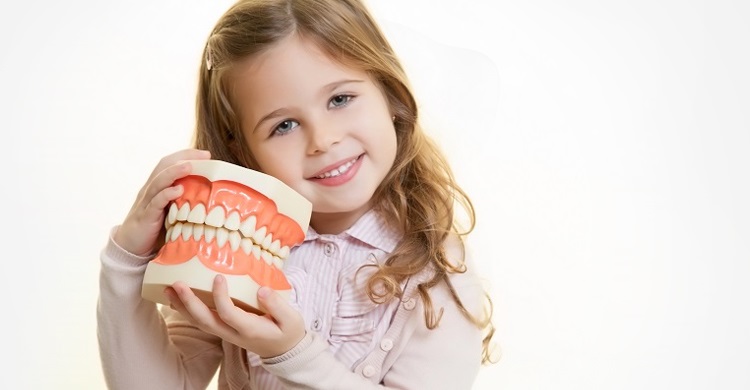
Blog Posts
RECENT BLOG POST


04 Aug 2021


10 Aug 2021


10 Aug 2021


By Dr. Aastha Chandra

08 Feb 2022
HABITS THAT ARE BAD FOR YOUR KIDS’ TEETH
- Neglecting Visits To The Dentist :- Please do not wait for a problem to bring your child to the dentist. We suggest that the kids visit the dentist within six months after their first tooth appears and no later than their first birthday. The dentist can evaluate the child for cavities and other oral problems, assess tooth decay risk, and instruct you on the proper ways to clean your baby’s teeth.
After the first visit, your child should continue to have regular check-ups at least every six months. If he is at increased risk of tooth decay, the dentist may recommend more frequent visits and fluoride treatment as well.
- Breast Feeding In Middle Of The Night :- Newborn babies may need round the clock feedings for the development of their health. But once your baby’s teeth begin to show, you may want to avoid those middle-of-the-night feeds. Lactose, which is the main sugar in breast milk, provides about 40 percent of a breastfed baby’s calories. Baby teeth can become decayed if overexposed to breast milk at night because of that sugar. We recommend to clean the baby’s mouth after a night feed. In fact, we recommend that you wash or wipe away the milk left in the baby’s mouth after every feeding.
- Sucking Baby Bottles :– While bottle-feeding a baby often leads to your little one falling asleep with the bottle in their mouth, removing the bottle is crucial. The problem with this habit is that the liquid sits in their mouth while they sleep. This can make your child more prone to tooth decay and cavities. Milk might seem to be a healthy choice, but it still contains sugars that can cause dental issues. This bacteria remains in your child’s mouth overnight, feeding on the milk’s sugars and creating harmful acids that lead to tooth decay.
‘Nursing bottle caries‘, characterised by pitting and discoloration on the teeth, can be a result of nighttime bottle-feeding. If the mouth isn’t cleaned, sugar from the milk or juice will remain on the teeth for a long time at night and can eventually eat away the enamel.
- Sipping On Sippy Cups All Day :– Do not let your child carry a sippy cup all day or take it to bed at night. Constantly sipping milk, juice, or any sweetened liquid does not give a child’s natural saliva a chance to rinse away sugars that cause tooth decay. Limit sippy cups to mealtime and snack time – and have your child swish and swallow with water after drinking any sugary drink.
- Swallowing Toothpaste :– Fluoride – a natural cavity fighter – is good for your child’s teeth. In fact, in communities that do not have enough fluoride in the water system, dentists may suggest fluoride supplements starting at six months old.
While many kids will fight parents on brushing their teeth, others enjoy it because they love the taste of toothpaste. Some kids will even swallow toothpaste, which can be dangerous.
Toothpastes contain fluoride in acceptable amounts. But swallowing toothpaste leads to an excess of fluoridewhich causes ‘fluorosis’, a condition that creates white or brown spots on your child’s teeth.
Until your child is old enough to be able to spit after brushing, you can use non-fluoride toothpaste specially made for children’s teeth.
- Thumb Sucking :– This habit offers comfort to children who have an instinct to suck from the day they are born. While thumb sucking is expected and safe for babies, as your child gets older, it should be discouraged. Once the permanent teeth start coming in – usually somewhere between the ages of 4 and 6 – thumb sucking can cause a misalignment of the teeth, which can lead to a number of issues, such as difficulty in chewing. The sucking interferes with the development of their jaw, the shape and roof of the mouth, and how their teeth grow. This can lead to the need for costly and uncomfortable treatments, such as braces, to address misalignments or special retainers to help treat malformed palates. Your child can also develop speech impediments, especially when trying to pronounce d’s and t’s. This can aslo lead to a “buck” tooth appearance as well as create a flat appearance on their thumb.
A helpful tip is to wrap your child’s thumbs with bandages or place hand socks on them at night. If this habit continues beyond age 4, please contact your dentist.
- Giving Pacifiers To Pre Schoolers :– Just like thumb sucking, sucking on a pacifier is a perfectly normal and healthy baby habit. However, pacifier use (just like thumb sucking) can also affect a child’s oral health by interfering with normal tooth and jaw development. Stop the use of pacifiers by age 1 to safeguard their teeth.
- Gnawing On Pencils :- This habit is very common in school kids.
In addition to introducing bacteria into the mouth, this habit can cause wearing away of tooth surfaces and can lead to dangerous oral trauma if a child falls while having a pen or pencil in the mouth.
- Nibbling On Nails :– About 30 to 60 percent of children and young teens bite their nails. A common issue with kids who suffer from anxiety, nail-biting is also a problem for bored kids. It can begin as early as the age of three and worsens as your child gets older. Nail biting is not only bad for the nails – it can cause serious damage to a child’s dental health. This is risky for teeth as it can cause cracks, chips and wear of the enamel.
Nail biting increases a child’s risk for bruxism, which is unintentional teeth grinding. In turn, bruxism can lead to facial pain and sensitive teeth. In younger children, they can also cause gaps in the front teeth.
- Bruxism – Teeth Grinding :- Like nail-biting, teeth grinding can be a sign of anxiety. This is also done subconsciously at night, and hence it is a little difficult to diagnose. Not only can grinding teeth wear down and damage the surface of teeth it can also lead to jaw problems that can even show up later in life. Grinding and clenching can lead to tooth wear and breakage and other symptoms such as tooth sensitivity, headaches, and temporomandibular joint disorder issues. If your little one clenches or grinds their teeth, consult with their dentist to see if a mouth guard can help reduce the wear and prevent damage.
- Bad Diet :– Offering your child too much sugar can lead to lifelong addictions to unhealthy food choices. Choosing healthy snacks and foods from the day they start eating solids is the best way to avoid this issue. Sugary diets lead to tooth decay. Eroded enamel can also lead to teeth sensitivity, teeth staining and loss of proper mouth function. You can ask your child to rinse after consuming sugary foods or liquids, in order to prevent them from sticking to the teeth.
- Brushing Too Hard :- It is essential to teach your child good brushing habits early on as well as make sure they have the proper tools. Explain to them that the point of brushing is to gently remove debris and plaque from their teeth and gum line, not to scrub their teeth. Many young children are overly aggressive when brushing. Brushing too hard or with a hard, nylon toothbrush can lead to root and tooth damage.

